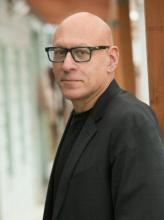What Is It
For decades, literary critics have been questioning the relevance of the novel as a literary form, with some going so far as to declare its death. But if the novel is dead, it’s not clear what new form can take its place. Should we treat the popularity of the memoir as a sign that what readers want is more truth, less fiction? Or is the memoir, like ‘reality TV,’ mostly just fiction dressed up as fact? In these fragmented times, when everything has already been said or done before, can there be any truly original innovations in art and literature? Or is the demand for originality itself an antiquated idea? John and Ken mix it up with David Shields, author of Reality Hunger: A Manifesto. This program was recorded live at the First Congregational Church in Portland, Oregon.
Listening Notes
Is everything nowadays just a remix of something else? Is pure originality really possible anymore? There are often sequels of sequels, remakes of remakes, and copies of copies among works of art. Is the true artist a purely original genius -- or is “genius” a unique convergence of influences? And are these convergences themselves works of art? Ken argues yes and that they cannot be reduced to their elements.
John and Ken are joined by David Shields, author of Reality Hunger: A Manifesto. David argues that creativity and plagiarism are inextricably tied together, a vision opposed to the common conception of a singular mind creating something ex nihilo. In short, the history of art is the history of plagiarism. David discusses how Shakespeare and T.S. Eliot, for example, both borrowed and improved a large number of sources before them. This leads David to the conclusion that the realm of art is the realm of ambiguity. Ken joins in that scholars also make clear the thinkers to which they are indebted, which does not mark a transgression. But how do we draw the line between homage and plagiarism? It appears to depend on the extent to which we “transform” the original work.
Clearly, copyright often gets in the way of the kind of remixing creativity that David promotes. What changes could we make to copyright law to make it more open and make the creative process less litigious? Of course, not all remixes are good or worthwhile, but is there some sort of agreement that can be reached among the writer, publisher, and lawyers for some middle ground?
- Roving Philosophical Reporter (Seek to 6:50): Caitlin speaks with Reverend Brown from the Presbyterian Church Reverend Brown, who borrowed liberally from a Philosophy Talk episode on gay pride and prejudice to give her own sermon to promote acceptance of the gay community.
Sixty-Second Philosopher (Seek to 47:00): Ian Shoales looks at the rise of literacy and growing collections or anthologies of books and magazines.
